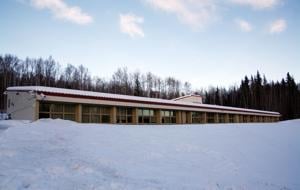A new charter school, Two Rivers HomeSTEAD, has submitted its application to the Fairbanks North Star Borough School District with plans to open for the academic year 2026/27. This initiative emerges following the closure of the previous pre-K-8 school in May, which had been a cornerstone of the local educational community.
Jasmine Wicks, president of the HomeSTEAD Academic Policy Committee (APC), emphasized the commitment of parents to preserve their children’s educational environment. “My daughter, this is not her first school closure; she also went to Joy. It’s really hard for students,” Wicks stated, highlighting the emotional impact of school closures on families.
The proposed curriculum at HomeSTEAD is rooted in a holistic learning approach, emphasizing practical skills such as animal skinning, hydroponic farming, and jam making. This educational philosophy builds on the groundwork laid by the former Two Rivers School. Chelsea Davis, a former employee of Two Rivers and a member of the APC, expressed the group’s determination to move forward after the school’s closure. “Unfortunately that didn’t happen, so now we were encouraged to start a charter, and we are continuing the theme along that same course,” she explained.
Recent enrollment projections suggest the potential for between 80 and over 100 students. The APC provided two financial scenarios in their charter application: one estimating costs of $1.3 million with 100 students and another at $1.65 million with 125 students. Notably, the budget is based solely on contributions from the district, intentionally excluding potential grants and the first-year charter allocation of $500,000 from the state.
Summer McMillan, vice chair of the APC, shared her perspective on financial sustainability. “I think it’s foolish to run a school based solely on grants; those grants are not promised year after year,” she said. Should the charter be approved, the committee plans to seek additional funding through grants, particularly from the U.S. Department of Agriculture.
The proposed staffing structure for a school of 100 includes 11 full-time positions. This encompasses six certified teachers, one of whom will divide responsibilities between physical education and special education, along with four support staff, two aides, an administrative worker, and a custodian. The school will also have a teaching principal who will lead homestead skills lessons.
Currently, the district’s BEST homeschool program operates out of the old Two Rivers School building. The APC intends to maintain this arrangement, fostering collaboration with BEST and allowing students to participate in activities at no cost. This partnership could streamline custodial responsibilities, enabling support staff to be allocated more efficiently.
For the new charter school, pre-K will remain free and accessible to all students. Classes are designed so that kindergarten will have one teacher, while subsequent grades will have two grade levels assigned to a teacher. Class sizes are estimated at a maximum of 24 students, slightly exceeding the state maximum of 23 but aligning with district standards. Should enrollment reach closer to 125, the APC is prepared to hire an additional teacher.
The charter application process has presented challenges, mainly due to the lack of a clear framework for submissions. The budget templates provided were based on larger charters, which complicated the APC’s planning. After observing the presentation by the Pearl Creek APC, the Two Rivers group made adjustments to their budget. They aim to present this updated financial plan to the school board on November 3.
Wicks noted that when Two Rivers School closed, many students transferred to Weller Elementary School, the BEST homeschool program, or other homeschooling options outside the district. Initial commitments indicate that several families who previously left the district for homeschooling are now interested in returning for the HomeSTEAD program.
“The Two Rivers community is deeply connected, and the school served as a vital gathering place,” McMillan remarked. The APC hopes to rekindle that sense of community by reopening the school as a charter. “Our school just felt like home, and these other schools, they’re not home to our community,” she concluded.





































































